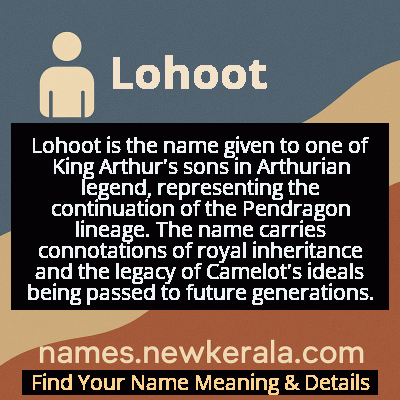Lohoot Name Meaning & Details
Origin, Popularity, Numerology Analysis & Name Meaning of Lohoot
Discover the origin, meaning, and cultural significance of the name LOHOOT. Delve into its historical roots and explore the lasting impact it has had on communities and traditions.
Name
Lohoot
Gender
Male
Origin
Arthurian
Lucky Number
4
Meaning of the Name - Lohoot
Lohoot is the name given to one of King Arthur's sons in Arthurian legend, representing the continuation of the Pendragon lineage. The name carries connotations of royal inheritance and the legacy of Camelot's ideals being passed to future generations.
Lohoot - Complete Numerology Analysis
Your Numerology Number
Based on Pythagorean Numerology System
Ruling Planet
Uranus (Rahu)
Positive Nature
Strong sense of order, loyal, practical, and disciplined.
Negative Traits
Stubborn, overly serious, rigid, and prone to feeling restricted.
Lucky Colours
Blue, gray.
Lucky Days
Saturday.
Lucky Stones
Blue sapphire.
Harmony Numbers
1, 7, 8.
Best Suited Professions
Managers, engineers, accountants, organizers.
What People Like About You
Dependability, discipline, practicality.
Famous People Named Lohoot
Lohoot ap Arthur
Legendary Knight
Son of King Arthur in Welsh Arthurian tradition, featured in medieval Welsh texts
Lohoot of Camelot
Royal Prince
Heir to the Round Table in certain Arthurian cycles, symbol of Arthurian legacy
Lohoot Pendragon
Mythical Warrior
Featured in Welsh triads as one of Arthur's sons who carried on his father's heroic legacy
Name Variations & International Equivalents
Click on blue names to explore their detailed meanings. Gray names with will be available soon.
Cultural & Historical Significance
Extended Personality Analysis
Lohoot is typically characterized by the complex psychological profile of a son born to legendary greatness. He embodies the chivalric virtues expected of Arthur's heir - courage, honor, loyalty, and a strong sense of justice - while also demonstrating the internal struggle of establishing his own identity separate from his father's monumental reputation. Literary portrayals often show him as thoughtful and introspective, possessing a strategic mind that complements his martial skills. Lohoot displays remarkable emotional resilience in facing the constant comparisons to his father, developing a quiet confidence that comes from overcoming the shadow of Arthur's legacy. His personality reflects the tension between duty to tradition and the need for personal authenticity, making him a deeply human figure within the Arthurian mythos. The traits associated with Lohoot include diplomatic intelligence, steadfast loyalty to Camelot's ideals, and a mature understanding of leadership that evolves throughout his journey.
Modern Usage & Popularity
In contemporary contexts, Lohoot remains a niche name primarily used within Arthurian enthusiast communities, historical fiction, and fantasy literature. Its modern usage is extremely rare as a given name but has seen occasional adoption by parents deeply interested in Arthurian legends or Welsh mythology. The name maintains its aristocratic and heroic connotations while offering a distinctive alternative to more common Arthurian names like Arthur, Lancelot, or Gawain. In recent years, there has been minimal but noticeable interest in the name within fantasy gaming communities and Arthurian revival movements, though it has not entered mainstream naming trends. Its usage continues to be symbolic rather than practical, chosen for its deep mythological roots and connection to the Arthurian legacy rather than contemporary popularity.
Symbolic & Spiritual Meanings
Lohoot symbolizes the eternal themes of legacy, inheritance, and the complex dynamics of famous parentage. As Arthur's son, he represents the living continuation of Camelot's ideals and the challenge of measuring up to legendary predecessors. Symbolically, he embodies the bridge between generations - carrying forward the wisdom and values of the past while navigating the unique challenges of his own era. The varying accounts of his fate in different Arthurian texts make him a symbol of both the fragility and resilience of dynastic lines, reflecting universal concerns about how greatness is preserved and transformed across generations. Lohoot serves as a metaphor for the tension between individual achievement and inherited identity, representing the universal human experience of building upon foundations laid by previous generations while establishing one's own meaningful contribution.

